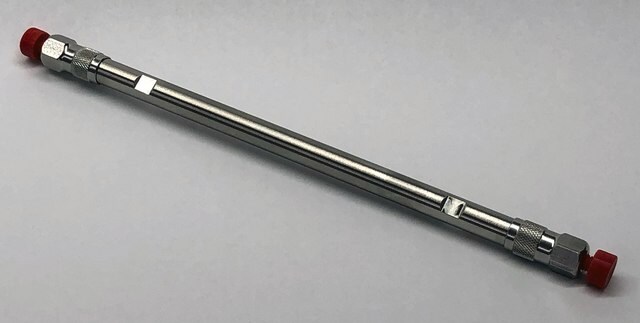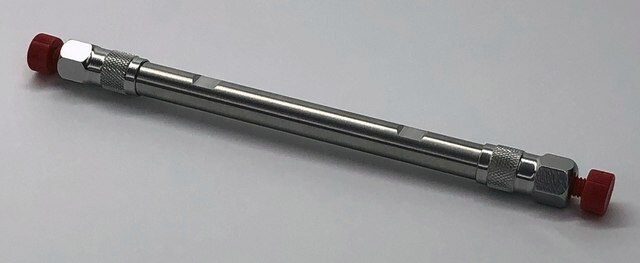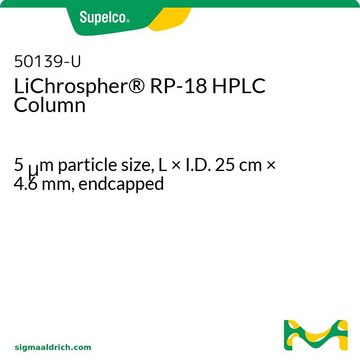53352-U
Ascentis® Express 90 Å Phenyl-Hexyl (2.7 μm) HPLC Columns
L × I.D. 10 cm × 4.6 mm, HPLC Column
Sinonimo/i:
Core-shell (SPP) Fused Core Phenyl HPLC column
About This Item
Prodotti consigliati
Nome del prodotto
Ascentis® Express Phenyl-Hexyl, 2.7 μm HPLC Column, 2.7 μm particle size, L × I.D. 10 cm × 4.6 mm
Materiali
stainless steel column
Livello qualitativo
agenzia
suitable for USP L11
Nome Commerciale
Ascentis®
Caratteristiche
endcapped
Produttore/marchio commerciale
Ascentis®
Confezionamento
1 ea of
Parametri
60 °C temp. range
600 bar max. pressure (9000 psi)
tecniche
HPLC: suitable
LC/MS: suitable
UHPLC-MS: suitable
UHPLC: suitable
Lungh. × D.I.
10 cm × 4.6 mm
Area superficiale
135 m2/g
Impurezze
<5 ppm metals
Matrice
Fused-Core particle platform
superficially porous particle
Gruppo funzionale matrice
phenylhexyl phase
Dimensione particelle
2.7 μm
Dimensione pori
90 Å
Intervallo di pH
2-9
applicazioni
food and beverages
Tecnica di separazione
reversed phase
Cerchi prodotti simili? Visita Guida al confronto tra prodotti
Categorie correlate
Descrizione generale
Applicazioni
- A fully automated and fast method using direct sample injection combined with fused-core column on-line SPE-HPLC for determination of ochratoxin A and citrinin in lager beers: Demonstrates the robustness of the Ascentis® Express Phenyl-Hexyl, 2.7 μm HPLC column in automating the detection of contaminants in beverages. This study showcases the column′s capacity for high throughput analysis, essential for quality control in the food industry, ensuring safety and compliance with regulatory standards (Lhotská et al., 2016).
- Advantages of core-shell particle columns in Sequential Injection Chromatography for determination of phenolic acids: This research highlights the efficiency of the Ascentis® Express Phenyl-Hexyl column in analyzing complex phenolic compounds, illustrating its superior performance in environmental and pharmaceutical applications. The column′s design enables enhanced separation capabilities, crucial for accurate phenolic profiling in various samples (Chocholouš et al., 2013).
Note legali
Precolonna
Prodotti correlati
Richiesto ma non fornito
Codice della classe di stoccaggio
11 - Combustible Solids
Classe di pericolosità dell'acqua (WGK)
WGK 3
Punto d’infiammabilità (°F)
Not applicable
Punto d’infiammabilità (°C)
Not applicable
Scegli una delle versioni più recenti:
Certificati d'analisi (COA)
Non trovi la versione di tuo interesse?
Se hai bisogno di una versione specifica, puoi cercare il certificato tramite il numero di lotto.
Possiedi già questo prodotto?
I documenti relativi ai prodotti acquistati recentemente sono disponibili nell’Archivio dei documenti.
Articoli
Improve your reversed phase selectivity for polar aromatics and heterocyclic compounds with the Ascentis® Express Phenyl-Hexyl U/HPLC column.
Protocolli
RP-Amide and HILIC, both amenable to the analysis of polar compounds, were successfully used to resolve several beverage components, including sugars, vitamins, sweeteners, preservatives, and caffeine.
Global Trade Item Number
| SKU | GTIN |
|---|---|
| 53352-U | 4061838530776 |
Il team dei nostri ricercatori vanta grande esperienza in tutte le aree della ricerca quali Life Science, scienza dei materiali, sintesi chimica, cromatografia, discipline analitiche, ecc..
Contatta l'Assistenza Tecnica.




